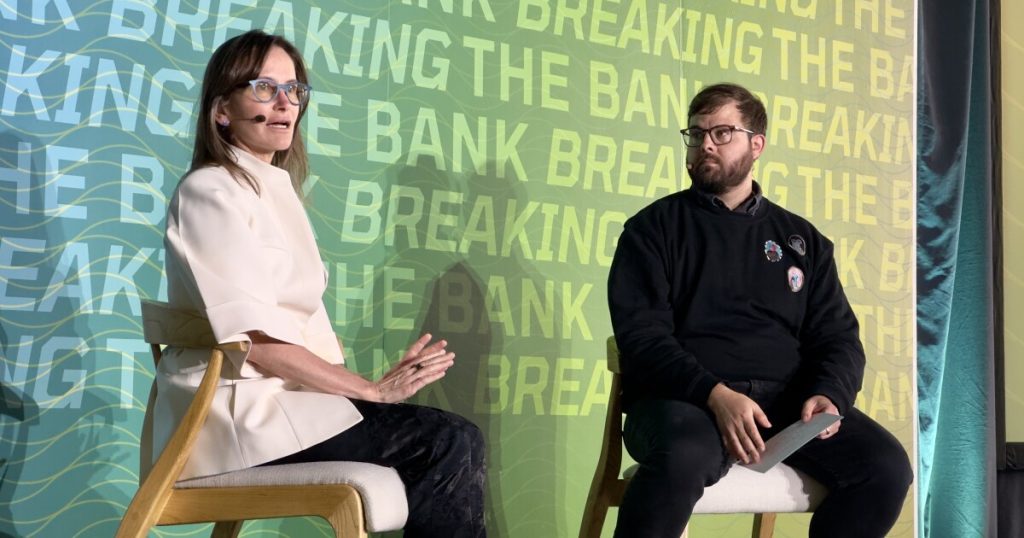SAN FRANCISCO — Never one to shy away from a hot take, Jackie Reses, CEO of Lead Bank, said during the opening panel of a fintech summit on Tuesday that she thought debanking — the practice of banks unilaterally closing a consumer or business account — was “a fiction, to some degree.”
Reses spoke at Breaking the Bank, an event put on in San Francisco by fintech journalist Eric Newcomer, about the GENIUS Act. On the opposite coast, the Senate had
“There was a lack of clarity — and still is — about, ‘Are we able to custody assets? Are we able to have stable[coin]s and other types of digital assets as clients?’ And I’m sure everyone has heard the noise around debanking,” Reses said.
Prior to the 2024 election, conservatives alleged that the Democratic administration was pressuring banks to drop clients aligned with certain political views or industries, including cryptocurrency.
The topic has become a live issue again under the Trump administration as conservatives introduce bills and implement policies to correct the perceived wrongs.
Before Reses finished her thought on debanking, Newcomer interjected to ask whether she was talking about debanking during the Biden administration or whether she thought there was more debanking to come.
“I think it didn’t exist,” Reses said. “I think it was a fiction, to some extent.”
Reses didn’t elaborate much on her thoughts related to debanking during the rest of the session. She continued with her thoughts about the GENIUS Act, saying that there needs to be definitions around market structure for stablecoins and related assets, such as cryptocurrencies.
The suggestion that debanking claims are overblown aligns with that of the Federal Reserve’s top regulator, Michael Barr. He said in February that he hadn’t seen “any evidence” that banks were debanking Republicans, and he pushed back against the idea that supervisors have attempted to discourage banks from doing business with companies and individuals that deal in cryptocurrencies.
Recent legislative efforts on debanking
During the session with Reses, Newcomer pointed out that her brother is the chief of staff to Vice President JD Vance, which she confirmed.
“My family text thread is not always happy,” Reses said.
As a senator in 2023, Vance introduced
In February, Republican Senators Kevin Cramer and Mark Mullin introduced the Fair Access to Banking Act, a bill the two have pushed in previous years as a way to prevent financial institutions from denying services to legal businesses based on reputational risk.
The bill seeks to prohibit federal banking agencies from recommending, encouraging or ordering banks to discriminate against any lawful industry. It was designed to ensure that legal industries, such as firearms, fossil fuels and cryptocurrency, have access to financial services.
There has been no action on the bill since its introduction three months ago.
Others weighed in to disagree
Other speakers at the Breaking the Bank summit also spoke about debanking, many in disagreement with Reses. Avlok Kohli, CEO of AngelList, offered the most stark contrast.
“It was absolutely real,” Kohli said during a panel to a question about debanking.
Kohli’s company offers services to both startups and investors, building tools and services meant to facilitate funding, equity management and talent acquisition for the startup ecosystem.
Kohli said that, because there are multiple banks that operate in the AngelList ecosystem, he was able to see each had different thresholds for their willingness to get involved in crypto or stablecoins.
Debanking also affected venture funds, Kohli said. In cases where a venture fund had exposure to crypto, banks would often refuse to work with that fund.
Zach Abrams, cofounder of Bridge, also disagreed with Reses. Acquired in February by Stripe, Bridge offers a stablecoin payments infrastructure to allow businesses to accept, use and issue stablecoins. The company launched three years ago, just before high-profile collapses of
“We probably went through like five different bank [partners], and we had everything from people just ghosting us to people telling us that there was some nebulous bucket of high-risk things, and that bucket was totally full,” Abrams said during a panel.
Newcomer asked Abrams whether it was the government pressuring the banks to drop clients like Bridge.
“I don’t know what the government was saying,” Abrams said. “I just know our experience of trying to work with banks in any capacity was pretty challenging.”
Newcomer asked Abrams whether there were any banks that he came away from that experience feeling good about.
“Oh, Lead Bank, for sure,” Abrams said. Indeed, Abrams’s Bridge
Maybe it’s just nuanced
William Hockey, CEO of Column, a bank targeted at enabling developers to create new financial products, said during a panel that he thought debanking was “nuanced” and not as simple as people on social media might make it out to be.
“Was there an accidental, or potentially somewhat pushed, effort to make the bar artificially high for certain people, certain organizations, in a certain industry class?” Hockey asked. “I think yes, there probably was.”
Hockey went on to suggest that bank regulators saw too great a degree of risk in banks working with cryptocurrency or stablecoin businesses and that there was a major disagreement between the actual risk and the perceived risk of those businesses.
